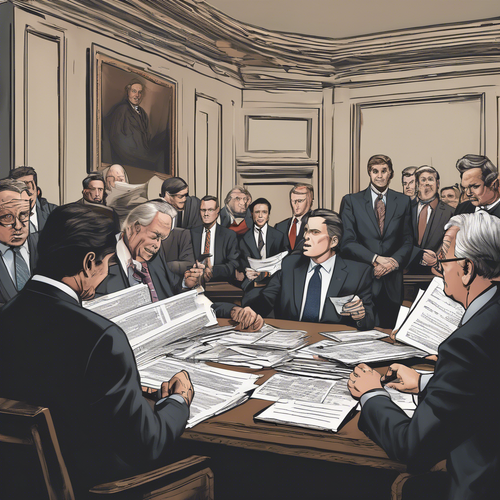Tax Cuts: Conservative Ideology in a Fiscal Prison 🏛️💰
In a political landscape where tax cuts reign supreme, one must question: are conservatives merely the jailers of their budgetary ambitions, caged by an unyielding ideology? This is a reality that they often fail to acknowledge, while simultaneously indulging in the very policies that may ultimately inhibit their broader objectives. It’s as if they’re locked in a gilded cage; the glimmer of golden tax breaks obscuring the bars holding them hostage. 🔒
For decades, the promise of reduced taxes has been the siren song of conservative politics, alluring the constituency with visions of prosperity unshackled from government overreach. Yet, the paradox lies in the way this fixation has devolved into a blistering dogma that rigorously resists any change or revision. How do we reconcile this with the emergency room of fiscal realities awaiting policymakers? 🩺
Constricted Fiscal Narrative: The Irony of Choice
The irony is palpable; the very tax cuts that conservatives herald as foundational to economic growth have become chains that limit fiscal flexibility. The pretense that slashing taxes alone will magically ignite growth is akin to believing that watering a wilted plant with a single drop of water will revive it. 💧 Data from the Congressional Budget Office reveals that while tax cuts often lead to short-term economic spikes, they frequently culminate in greater deficits and debts, leaving the unwavering tax-cutters trapped in a cycle of expectation versus reality.
Striking Antithesis: Growth vs. Responsibility
The conservative narrative creates an antithesis that often pits economic growth against fiscal responsibility—two forces seemingly at odds, yet not necessarily irreconcilable. While proponents argue that lower taxes stimulate job creation, critics assert that such policies erode the social safety net. For many, this presents a bitter pill to swallow: the relentless pursuit of tax cuts yields a fragile economy, one that is susceptible to shocks from external forces, from international crises to domestic upheavals. Such shocks expose the inadequacies of a financial strategy rooted solely in reduced taxation.
- Jobs Created: Indeed, tax cuts can spur job growth, but what happens when those jobs come at the expense of crucial public investments?
- Safety Nets: Can a society that prioritizes tax cuts over social welfare genuinely claim to stand by conservatives’ principles of community and care?
- Debt Increases: What becomes of an economy where the rhetoric of growth continually bumps against the reality of ballooning deficits?
When juxtaposed against the lived experiences of everyday Americans, the mythos of the tax-cut panacea seems distant and abstract, much like a mirage on the horizon—glimmering but ultimately out of reach. 🌅
Budgeting in the Shadows: When Cuts Stymie Progress
Furthermore, conservative adherence to tax cuts often leads to severe budgetary constraints that stifle innovation in essential sectors like education and infrastructure. Imagine a school languishing in disrepair, the crumbling walls akin to the withering commitment to future generations. Administrators are left to choose between paying for textbooks or maintaining safe facilities; a tragic misplacement of priorities. 🏫
While it may appear that cutting taxes yields immediate gratification, the long-term costs manifest as deterioration of public services. An underfunded education system today becomes a workforce with limited skills tomorrow, creating a cyclical erosion of potential among the youth. Here lies the bitter irony — in attempting to reduce the tax burden, conservatives inadvertently impose a heavier burden on the future, jeopardizing economic growth and societal well-being. 🔄
Imagining a Different Future: Breaking the Tax Cut Chains
So where do conservatives go from here? What would it entail to break free from the confines of their self-imposed prison? It may start with acknowledging the complexity of modern economies that require robust investment in both human and physical capital. Is the answer a balanced approach—tax cuts paired with increased federal investment? Or is it a re-evaluation of what fiscal conservatism truly means in a world that values innovation, sustainability, and equitable growth?
In the realm of political philosophy, one must recognize that progress often necessitates change—a shift from the steadfast belief that tax cuts alone will solve our economic woes. Rather, a willingness to explore novel fiscal frameworks that embrace both the nobility of reducing tax burdens and the necessity of maintaining vital public services may be the key to unlocking a more prosperous future. 🔑
Thus, as conservatives stand at this fiscal crossroads, they are confronted not just with choices but with the echoes of their own ideology—reminders that a singular focus may not be the path to redemption, but rather a detour that leads to a dead end. So, will they rise from the ashes of dogmatism, or continue to dwell in a tax-cut prison? Only time will tell. ⏳


